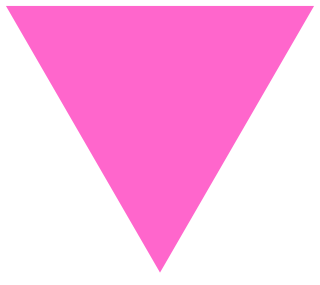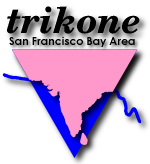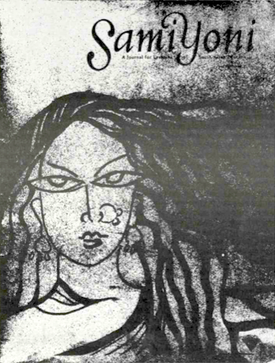Related Research Articles

A pink triangle has been a symbol for the LGBT community, initially intended as a badge of shame, but later reappropriated as a positive symbol of self-identity. In Nazi Germany in the 1930s and 1940s, it began as one of the Nazi concentration camp badges, distinguishing those imprisoned because they had been identified by authorities as gay men or trans women. In the 1970s, it was revived as a symbol of protest against homophobia, and has since been adopted by the larger LGBT community as a popular symbol of LGBT pride and the LGBT movements and queer liberation movements.

LGBT stereotypes are stereotypes about lesbian, gay, bisexual and transgender (LGBTQ) people based on their sexual orientations, gender identities, or gender expressions. Stereotypical perceptions may be acquired through interactions with parents, teachers, peers and mass media, or, more generally, through a lack of firsthand familiarity, resulting in an increased reliance on generalizations.

LGBT movements in the United States comprise an interwoven history of lesbian, gay, bisexual, transgender and allied social movements in the United States of America, beginning in the early 20th century. A commonly stated goal among these movements is social equality for LGBT people. Some have also focused on building LGBT communities or worked towards liberation for the broader society from biphobia, homophobia, and transphobia. LGBT movements organized today are made up of a wide range of political activism and cultural activity, including lobbying, street marches, social groups, media, art, and research. Sociologist Mary Bernstein writes: "For the lesbian and gay movement, then, cultural goals include challenging dominant constructions of masculinity and femininity, homophobia, and the primacy of the gendered heterosexual nuclear family (heteronormativity). Political goals include changing laws and policies in order to gain new rights, benefits, and protections from harm." Bernstein emphasizes that activists seek both types of goals in both the civil and political spheres.

Trikone is a non-profit support, social, and political organization for South Asian bisexual, lesbian, gay, and transgender people. It was founded in 1986 in the San Francisco Bay Area and is one of the oldest groups of its kind in the world. South Asians affiliated with Trikone are from or trace their ancestry to the following countries: Afghanistan, Bangladesh, Bhutan, India, Maldives, Burma, Nepal, Pakistan, Sri Lanka, and Tibet. Trikone published an eponymous magazine with an international base of subscribers several times a year. The magazine was the oldest South Asian LGBT magazine in the U.S., and ran from 1986 to 2014.
Racism is a concern for many in the Western lesbian, gay, bisexual and transgender (LGBTQ) communities, with members of racial, ethnic, and national minorities reporting having faced discrimination from other LGBT people.
This is a timeline of notable events in the history of non-heterosexual conforming people of South Asian ancestry, who may identify as LGBTIQGNC, men who have sex with men, or related culturally-specific identities such as Hijra, Aravani, Thirunangaigal, Khwajasara, Kothi, Thirunambigal, Jogappa, Jogatha, or Shiva Shakti. The recorded history traces back at least two millennia.

The lesbian, gay, bisexual and transgender (LGBTQ) community in San Francisco is one of the largest and most prominent LGBT communities in the United States, and is one of the most important in the history of American LGBT rights and activism alongside New York City. The city itself has been described as "the original 'gay-friendly city'". LGBT culture is also active within companies that are based in Silicon Valley, which is located within the southern San Francisco Bay Area.
Crystal Jang is an LGBT activist based in San Francisco, California. She is one of the co-founders of the San Francisco Bay Area based organization, Asian Pacific Islander Queer Women and Transgender Community (APIQWTC), as well as community-based organization Older Asian Sisters in Solidarity (OASIS), which is now a part of APIQWTC.

Cecilia Chung is a civil rights leader and activist for LGBT rights, HIV/AIDS awareness, health advocacy, and social justice. She is a trans woman, and her life story was one of four main storylines in the 2017 ABC miniseries When We Rise about LGBT rights in the 1970s and 1980s.

The following outline offers an overview and guide to LGBTQ topics:
Shamakami was an early organization of South Asian lesbians and bisexual women based in the United States. They published a newsletter of the same name between June 1990 and February 1997.
The National Queer Asian Pacific Islander Alliance (NQAPIA) is an American federation of Asian American, South Asian, Southeast Asian. and Pacific Islander LGBTQ organizations. NQAPIA was formed in 2007, as an outgrowth of the LGBT APA Roundtable working groups at the 2005 National Gay Lesbian Task Force Creating Change Conference in Oakland, California. NQAPIA seeks to build the capacity of local LGBT AAPI organizations, invigorate grassroots organizing, develop leadership, and challenge homophobia, racism, and anti-immigrant bias. The organization "focuses on grass-roots organizing and leadership development."
GAPIMNY is an all-volunteer-run organization that provides a range of social, educational, and cultural programming for queer and transgender people who are Asian and/or Pacific Islander in the New York City metropolitan area to support each other. The organization's community building efforts is intricately tied to political education and mutual aid.
Sexuality, including same-sex sexuality, and other non-normative forms of sexuality have been central to the history of Chinatown, San Francisco. San Francisco's Chinatown, founded in 1848, is the first and largest in the United States. San Francisco was shaped by early Chinese immigrants, who came from the Guangdong province of southern China. These immigrants gathered in the Bay Area in order to join in the California Gold Rush and to build railroads in the American West. San Francisco's Chinatown made room for these early Chinese immigrants to live, and the area turned into a "bachelor society", where female prostitution was pervasive because of the Chinese Exclusion Act. As a racialized immigration region, Chinatown was viewed as an immoral place with the characteristics of "vice", "sluttery" and "sexual deviance" for a long time. These traits were incompatible with the mainstream culture and dominant norms of American society. From the mid-19th century, the state problematized Chinese female prostitution with the subject of sexual transmission, and the government began to go against industrial prostitution in Chinatown, as well as Chinese immigration. As the sex industry grew throughout the Bay Area, the government had to stop the anti-prostitution and anti-immigration law in the beginning of the 20th century. Just like the Castro district and other areas, Chinatown developed its own sexual industries and provided a variety of sexual entertainment to both immigrants and white visitors.
Filipino American LGBT Studies is a field of studies that focus on the issues met by people at the intersection of Filipino American and lesbian, gay, bisexual, and transgender identities.

Rev. Trinity Ordoña is a lesbian Filipino-American college teacher, activist, community organizer, and ordained minister currently residing in the San Francisco Bay Area. She is notable for her grassroots work on intersectional social justice. Her activism includes issues of voice and visibility for Asian/Pacific gay, lesbian, bisexual, transgender and queer individuals and their families, Lesbians of color, and survivors of sexual abuse. Her works include her dissertation Coming Out Together: an ethnohistory of the Asian and Pacific Islander queer women's and transgendered people's movement of San Francisco, as well as various interviews and articles published in anthologies like Filipino Americans: Transformation and Identity and Asian/Pacific Islander American Women: A Historical Anthology. She co-founded Asian and Pacific Islander Family Pride (APIFP), which "[sustains] support networks for API families with members who are LGBTQ," founded Healing for Change, "a CCSF student organization that sponsors campus-community healing events directed to survivors of violence and abuse," and is currently an instructor in the Lesbian, Gay, Bisexual and Transgender Studies Department at City College of San Francisco.

The GLBTQ+ Asian Pacific Alliance, sometimes GAPA, is a 501(c)(4) non-profit social welfare organization that was incorporated in February 1988 in San Francisco, California, as a social support group for gay and bisexual Asian Pacific Islander (API) men. It engages in direct social, cultural and political advocacy, with a vision of "a powerful queer and transgender Asian and Pacific-Islander (QTAPI) community that is seen, heard, and celebrated," and a mission "to unite our families and allies to build a community through advocacy, inclusion, and love."

The following is a timeline of lesbian, gay, bisexual, and transgender (LGBT) history in the 20th century.
Kitty Tsui is an American author, poet, actor, and bodybuilder. She was the first known Asian American lesbian to publish a book.

SamiYoni was a Canadian magazine for lesbians of South Asian descent, published between 1993–1994.
References
- ↑ Ed. Wayne Dynes, Encyclopaedia of Homosexuality, New York, 1990, pp216
- ↑ Kang, Wenqing. Obsession: male same-sex relations in China, 1900-1950, Hong Kong University Press. Page 3
- 1 2 3 4 5 6 7 "Asian American Institute" (PDF). Asian American Historical Timeline.
- 1 2 3 4 5 6 7 8 9 10 11 12 13 14 15 16 17 18 "Smithsonian Asian Pacific American Center". Timeline.
- 1 2 3 4 5 "Legacy of Japanese American Activism Conference". Japanese American Activist Timeline. 24 May 2011.
- 1 2 3 4 5 6 7 8 9 10 11 "American Experience". Milestones in the American Gay Rights Movement.
- ↑ "APIQWTC History" (PDF).
- ↑ "Alliance of Massachusetts Asian Lesbians and Gay Men/Boston Asian Gay Men and Lesbians Collection". The History Project. Retrieved July 1, 2020.
- ↑ "About QAPA". 16 March 2011.
- ↑ "Asian American Resource Workshop records".
- ↑ Asian/Pacific Islander American Women: A Historical Anthology. p. 327.
- 1 2 3 Hune, Shirley; Nomura, Gail (eds.). Asian/Pacific Islander American Women: A Historical Anthology. pp. 327–331.
- ↑ Yang, Guiyou (2006). The Columbia Guide to Asian American Literature since 1945. Columbia University Press. p. 108. ISBN 9780231126205.
- ↑ "AVERT". History of HIV & AIDS in the U.S.A.
- ↑ Ordona, Trinity. Coming Out Together: An Ethnohistory of the Asian and Pacific Islander Queer Women's and Transgendered People's Movement of San Francisco. p. 183.
- 1 2 Encyclopedia of Lesbian and Gay Histories and Cultures. pp. 118, 75.
- ↑ Asian/Pacific Islander American Women: A Historical Anthology. p. 329.
- ↑ "Kitty Tsui | Asian Pacific Islander Queer Women & Transgender Community". apiqwtc.org. 27 March 2017. Retrieved 30 September 2019.
- ↑ "Timeline: The Bisexual Health Movement in the US". BiNetUSA. Archived from the original on 2019-10-22. Retrieved 2012-06-09.
- ↑ Gay and Lesbian Literary Heritage.
- ↑ "Trikone". Archived from the original on June 13, 2013. Retrieved August 6, 2015.
- ↑ Asian/Pacific Islander American Women: A Historical Anthology. p. 330.
- ↑ "Trikone". Publication. Retrieved August 6, 2015.
- ↑ Vida, Ginny, ed. (1978). New Our Right To Love: A Lesbian Resource Book . Touchstone. ISBN 0684806827.
- ↑ "Lavender Godzilla: voices of the Gay Asian Pacific Alliance".
- ↑ "Asian American Literature".
- ↑ Misir, Deborah N. (1966). "The Murder of Navroze Mody: Race, Violence, and the Search for Order". Amerasia Journal. 22 (2): 55–76. doi:10.17953/amer.22.2.5383143vq7222t92.
- ↑ "About GAPA".
- 1 2 3 Lesbian Histories and Cultures: An Encyclopedia, Volume 1. 2000. p. 74.
- 1 2 "Smithsonian Asia Pacific American Center". Timeline.
- ↑ "GAPIMNY Website".
- ↑ Garrison, Julie (2011). Lesbians in East Asia: Diversity, Identities, and Resistance. Harrington Park Press. p. 73. ISBN 978-1560236924.
- ↑ "ILGA's Directory of LGBTI and Allied Organizations". International Lesbian, Gay, Trans and Intersex Association.
- ↑ Haggerty, George; Immerman, Bonnie (eds.). Encyclopedia of Lesbian and Gay Histories and Cultures. pp. 74–75.
- ↑ Wehbi, Samantha (2013). Community Organizing Against Homophobia and Heterosexism: The World Through Rainbow-Colored Glasses. Binghamton, New York: Routledge. p. 70. ISBN 978-1560232698.
- ↑ "Purple Moon Dance: About Us".
- ↑ Yung, Judy (1995). Unbound Feet: A Social History of Chinese Women in San Francisco .
- ↑ "Trikone Atlanta".
- ↑ "South Bay Queer and Asian".
- ↑ Johnson, Carol; Patternote, David; Tremblay, Manon, eds. (January 2013). The Lesbian and Gay Movement and the State: Comparative Insights into a Transformed Relationship. Ashgate Publishing. p. 143.
- ↑ "Khush DC".
- ↑ "MAPLBN".
- ↑ "PFLAG". Education and Programs. Retrieved August 4, 2015.
- ↑ Biegel, Stuart (2010). The Right to be Out: Sexual Orientation and Gender Identity in America's Public Schools . Minneapolis: Regents of the University of Minnesota. pp. 128.
- ↑ "APIQWTC". API LGBTQ Groups in the Bay Area. 13 January 2013. Retrieved August 4, 2015.
- ↑ "Trikone". QRD. Retrieved August 5, 2015.
- ↑ "Trikone: Lesbian and Gay South Asians". Pride Utsav '95 "Affirming our culture, celebrating our sexuality". Retrieved August 5, 2015.
- ↑ Tremblay, Manon (2015). Queer Mobilizations: Social Movement Activism and Canadian Public Policy. UBC Press. ISBN 978-0774829106 . Retrieved 21 January 2016.
- ↑ Warner, Tom (2002). Never Going Back: A History of Queer Activism in Canada. University of Toronto Press. p. 327. ISBN 0802084605 . Retrieved 21 January 2016.
- ↑ "barangay-LA". Filipino LGBTQ Organization. Retrieved August 5, 2015.
- ↑ "Filipina Women's Network" . Retrieved August 5, 2015.
- ↑ "Mayor's Office of Gay, Lesbian, Bisexual and Transgender Affairs". AQUA -- API Queers United For Action. Retrieved August 5, 2015.
- ↑ "SATRANG" . Retrieved August 5, 2015.
- ↑ "Asian Pacific Islander Queer Sisters" . Retrieved August 5, 2015.
- ↑ Kenney, Moira Rachel (2001). Mapping Gay L.A. Philadelphia: Temple University Press. p. 195. ISBN 9781566398848.
- ↑ "The Desi Queer Datebook" (PDF). Retrieved August 5, 2015.
- ↑ "GALVA-108" . Retrieved August 5, 2015.
- ↑ "About Us" . Retrieved August 5, 2015.
- ↑ "saalt" (PDF). In the Face of Xenophobia.
- ↑ "Shades of Yellow: S.O.Y." Retrieved August 5, 2015.
- ↑ "SAN FRANCISCO / Thousands protest legalizing same-sex marriage / Asian Americans, Christians rally in Sunset District" . Retrieved 2015-08-08.
- ↑ Dang, Alain, Hu, Mandy. "Asian Pacific American Lesbian, Gay, Bisexual and Transgender People: A Community Portrait" (PDF). A Report from New York's Queer Asian Pacific Legacy Conference, 2004. Retrieved August 5, 2015.
{{cite web}}: CS1 maint: multiple names: authors list (link) - ↑ "API Equality - Northern California History". API Equality - Northern California. Retrieved 20 October 2014.
- ↑ "q-wave". Our History. Retrieved August 5, 2015.
- ↑ "API Equality - LA". About. Retrieved August 5, 2015.
- ↑ "Philly Gay Calendar". Organizations. Retrieved August 5, 2015.
- ↑ "Invisible to Invincible: Asian Pacific Islander Pride of Chicago". The Evolution of i2i (2003-2011). Retrieved August 5, 2015.
- ↑ "The Dari Project" . Retrieved August 5, 2015.
- ↑ "In God's House". Asian American Lesbian & Gay Families in the Church. Retrieved August 5, 2015.
- ↑ "A National Conference of Lesbian, Gay, Bisexual, and Transgender Asian Americans, South Asians, and Pacific Islanders" (PDF). August 2009. Retrieved March 2, 2021.
- ↑ "Philly Weekly". Asian Lesbians Find Their Niche. Retrieved August 5, 2015.
- ↑ "hotpot! Philly". About Us. Retrieved August 5, 2015.
- ↑ "Asian American Press". Queer Southeast Asian Conference. Retrieved August 5, 2015.
- ↑ "AAPIP.org Building Democratic Philanthropy". Creating a Piece of History. Retrieved August 5, 2015.
- ↑ "DeqH Desi lgbtQ Helpline for South Asians" . Retrieved August 5, 2015.
- ↑ "The First South Asian LGBTQ National Helpline" . Retrieved August 5, 2015.
- ↑ "Red Envelope Giving Circle" (PDF). Tradition 2.0: Red Envelope Giving Circle Puts a New Spin on an Old Tradition. Retrieved August 5, 2015.
- ↑ "Dragon Fruit Project" . Retrieved August 5, 2015.
- ↑ "issuu". The Tran 100 2014 (U.S.). Retrieved August 5, 2015.
- ↑ "GLBT Historical Society". About the GLBT History Museum. Retrieved August 5, 2015.
- ↑ Rudolph, Christopher (September 12, 2018). "Pro Golfer Tadd Fujiwaka Comes Out as Gay". NewNowNext.
- ↑ Manzella, Sam. "Model Geena Rocero Makes "Playboy" History". NewNowNext. Retrieved 2019-06-25.
- ↑ "SF to mark nation's first LGBTQ API Week". 2021-05-08.